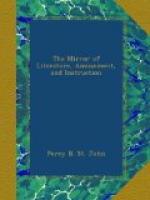* * * * *
ACROSTIC.
C ould angel’s voice, or poet’s
lays,
A ttune my votive song to praise
R esistless then I’d touch the lyre,
O r chant her praise, whom all admire.
L et candour, dearest maid, excuse;
I claim no kindred to the muse,
N or can a lowly song of mine
E xpress the worth of Caroline.
A.C.
* * * * *
“JACK OF BOTH SIDES.”
This proverb is derived from the Greek, and applied to Theramenes, who was at first a mighty stickler for the thirty tyrants’ authority: but when they began to abuse it by defending such outrageous practices, no man more violently opposed it than he; and this (says Potter) got him the nick-name of “Jack of both sides,” from Cothurnus, which was a kind of shoe that fitted both feet. P.T.W.
* * * * *
PLAY OF “CAESAR IN EGYPT.”
When the pack’d audience from their
posts retir’d,
And Julius in a general hiss expir’d,
Sage Booth to Cibber cried, “Compute
your gains;
These Egypt dogs, and their old dowdy
queens,
But ill requite these habits and these
scenes!
To rob Corneille for such a motley piece—
His geese were swans, but, zounds, thy
swans are geese.”
Rubbing his firm, invulnerable brow,
The bard replied, “The critics must
allow,
’Twas ne’er in Caesar’s
destiny to run.”
Wils bow’d, and bless’d
the gay, pacific pun.
Mist’s
Journal, 1724.
* * * * *
FRIENDSHIP AND LOVE.
Friendship is like the cobbler’s tye,
That binds two soles in unity;
But love is like the cobbler’s awl,
That pierces through the soul and all.
W.J.
* * * * *
Why is St. Giles’s clock like a pelisse, and unlike a cloak?—Because it shows the figure without confining the hands.
“STRICTOR.”
* * * * *
CORPORATION LEARNING.
The mayor of a country town, conceiving that the word clause was in the plural number, would often talk of a claw in an act of parliament.
* * * * *
A HUNDRED POUND NOTE.
The following pathetic soliloquy was found written on the back of a hundred pound note of the National Bank, which passed through our hands lately, and we are sorry we can now add our sympathies to those of our poet on the transitory nature of those sublunary enjoyments:—
“A little while ye hae been mine;
Nae langer can I keep ye;
I fear ye’ll ne’er be mine
again,
Nor any ither like ye.”




